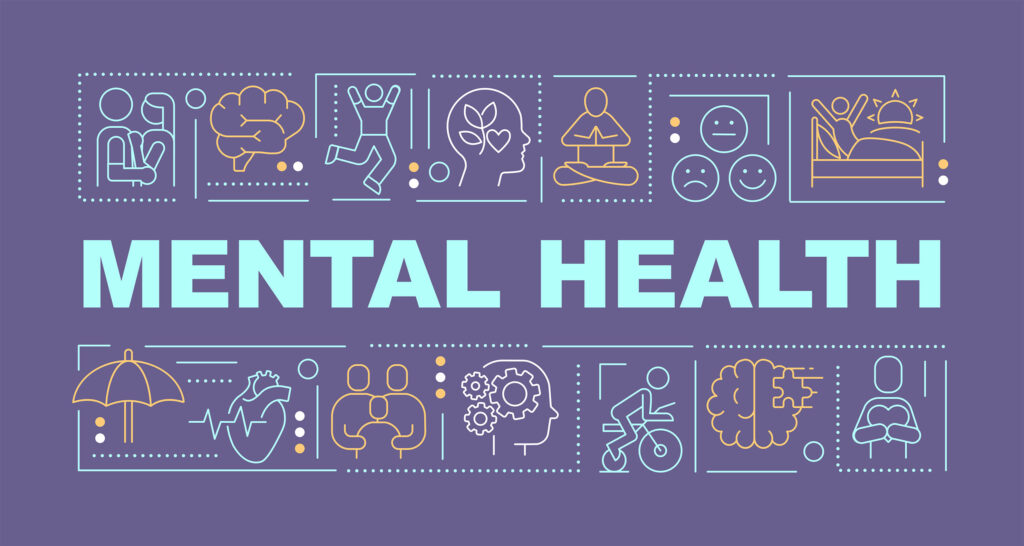Comprehensive Overview to Mental Wellness: Recognizing Therapy, Treatment, and Available Resources
Mental health and wellness is an important facet of general well-being. Recognizing the different forms of counseling and treatment can encourage individuals encountering obstacles. Each therapy kind is designed to satisfy certain requirements, offering customized assistance. However, many remain unaware of the resources offered to them. This overview aims to illuminate these alternatives, resolving common concerns and barriers. It elevates an essential inquiry: just how can one properly navigate the complexities of mental health assistance?
Recognizing Mental Wellness and Its Importance
Mental health and wellness offers as a necessary foundation for overall health, influencing just how people think, feel, and engage with others. It includes psychological, emotional, and social facets, impacting day-to-day functioning and lifestyle. Great psychological health and wellness promotes strength, making it possible for individuals to handle stress and anxiety and navigate difficulties properly. On the other hand, bad psychological wellness can result in a range of concerns, including stress and anxiety, depression, and difficulty in relationships.Understanding psychological health is important, as it aids to lower stigma and motivates open conversations concerning emotional battles. When needed, awareness of mental health also emphasizes the importance of self-care and looking for aid. People who prioritize their mental well-being are a lot more most likely to take part in healthy behaviors, preserve meeting partnerships, and add favorably to their neighborhoods. Identifying the value of psychological wellness promotes an all natural approach to health, ultimately boosting the total quality of life for people and culture overall.

Kinds of Therapy and Therapy
Reliable psychological health care commonly includes various types of therapy and therapy customized to individual needs. One usual type is individual therapy, where a therapist functions one-on-one with a customer to deal with particular issues. Group therapy, on the other hand, enables individuals to share experiences and sustain each other in an organized setting, commonly directed by a facilitator. Family members therapy concentrates on improving interaction and dealing with disputes within family members dynamics, while pairs therapy addresses partnership challenges in between partners.Additionally, specialized therapy kinds, such as occupation therapy or grief therapy, target details life situations - Marriage Counselling. Cognitive-behavioral treatment (CBT) highlights the partnership between ideas, habits, and feelings, whereas holistic techniques could integrate numerous techniques, including mindfulness and art therapy. Each kind serves distinct purposes, offering varied pathways for individuals looking for to improve their psychological wellness and health
Usual Healing Methods
Different therapeutic methods play a crucial role in mental health and wellness therapy. Cognitive Behavior modification focuses on changing negative thought patterns, while Psychodynamic Therapy Strategies explore unconscious procedures. Humanistic strategies emphasize personal development and self-actualization, supplying diverse paths for recovery.
Cognitive Behavioral Therapy
Cognitive Behavior Modification (CBT) stands apart as a commonly recognized strategy in the area of mental wellness treatment, emphasizing the connection between feelings, actions, and ideas. This organized, ambitious therapy aims to determine and challenge unfavorable idea patterns, enabling individuals to create much healthier coping devices. CBT is commonly used to address various psychological health issues, including anxiety, clinical depression, and obsessive-compulsive condition. Sessions commonly involve the therapist and client working collaboratively to establish specific goals and review development. Strategies made use of in CBT might include cognitive restructuring, exposure treatment, and skill-building exercises. With these methods, people find out to change their thought processes and habits, ultimately fostering emotional resilience and boosting total mental wellness.
Psychodynamic Treatment Strategies
Psychodynamic treatment strategies focus on checking out the unconscious mind to recognize just how previous experiences form existing habits and feelings. Trick methods include totally free organization, where customers reveal ideas without censorship, enabling the emergence of subconscious feelings. Dream analysis is an additional important technique, enabling therapists to analyze the symbolic definitions of desires, disclosing hidden conflicts. Transfer plays a considerable duty, as customers task feelings and mindsets from past relationships onto the specialist, providing insights right into relational patterns. In addition, specialists might make use of interpretation, aiding customers gain recognition of underlying conflicts and problems. By cultivating a much deeper understanding of internal processes, psychodynamic treatment intends to promote psychological healing and personal development, ultimately boosting clients' self-awareness and connections.

Humanistic Approaches Explained
Humanistic methods to therapy stress the inherent possibility for individual development and self-actualization within each person. Rooted in the works of theorists like Carl Rogers and Abraham Maslow, these approaches prioritize the subjective experiences of clients, fostering an atmosphere of compassion and approval. Specialists commonly utilize methods such as active listening and genuine favorable regard, allowing clients to explore their ideas and sensations in a secure space. The goal is to help people identify their strengths and establish a much deeper understanding of themselves, eventually resulting in greater psychological health. By concentrating on individual values and self-discovery, humanistic treatment encourages clients to take responsibility for their options and grow an even more authentic existence.
Finding the Right Mental Health Specialist
Finding the ideal mental health professional is necessary for efficient therapy. People must know the various kinds of experts readily available, such as psycho therapists, psychoanalysts, and licensed counselors. Assessing their certifications and experience can aid guarantee a good match for one's specific requirements.
Kinds of Professionals
Steering through the landscape of psychological wellness care can be overwhelming, particularly when it involves selecting the right expert. Various kinds of psychological health experts exist, each focusing on different aspects of treatment. Psychiatrists are clinical doctors who can suggest medication and address facility psychological health conditions. Psycho therapists concentrate on treatment and assessment, giving counseling and testing solutions. Accredited therapists and social employees typically supply assistance through talk treatment, aiding clients browse life obstacles. Marital relationship and family members therapists concentrate on relational concerns, aiming to boost communication and characteristics within households. Psychiatric nurses supply treatment and support, usually functioning together with psychoanalysts to keep track of drug and therapy strategies. Comprehending these duties can help people in making notified options for their psychological health and wellness demands.
Examining Qualifications and Experience
When looking for the right psychological health and wellness specialist, reviewing their credentials and experience is vital for ensuring efficient care. Possible customers should verify that the specialist holds pertinent levels, licenses, and qualifications in their field of expertise. In addition, comprehending the specialist's field of expertise-- such as professional psychology, social job, or counseling-- can assist align their skills with the client's particular needs. Experience matters, as specialists with a strong record in treating certain conditions may supply extra reliable strategies - Cognitive Behavioural Therapy. Clients may also take into consideration the therapist's approach and methodologies by reviewing reviews or evaluations. Eventually, a thorough analysis of qualifications and experience can significantly affect the therapeutic connection and the general success of mental health and wellness therapy
Area Resources for Mental Wellness Assistance
Countless community resources are readily available to sustain people looking for mental health and wellness support. Local mental wellness organizations commonly give services such as therapy, support groups, and instructional programs focused on promoting mental health. Lots of neighborhoods also supply helplines, which attach individuals with experienced specialists that can provide immediate support and guidance.Nonprofit organizations regularly promote workshops and neighborhood events to increase awareness concerning mental wellness problems and decrease preconception. Universities and colleges may have therapy services readily available for students, ensuring that youths have accessibility to necessary support.Additionally, locations of prayer commonly produce risk-free spaces for individuals to review their psychological health and wellness struggles and discover convenience within their neighborhoods. By utilizing these resources, people can navigate their mental health and wellness challenges better and locate a sense of understanding and belonging in their neighborhood environments.
Getting Rid Of Barriers to Looking For Aid
When it comes to looking for help for psychological health problems, many individuals deal with considerable barriers. Preconception often looms big, deterring individuals from connecting because of be afraid of judgment or misunderstanding. Additionally, an absence of recognition concerning readily available sources can make complex the decision-making procedure, leaving prospective clients really feeling separated. Financial restraints also play a crucial function; many people can not pay for therapy or counseling services, which can intensify their struggles. In addition, cultural distinctions might influence understandings of psychological wellness, making it testing for some to look for support. Geographical restrictions contribute as well, specifically in backwoods where mental health professionals might be scarce. Getting rid of these barriers needs a diverse technique, consisting of education and learning to minimize stigma, boosted access to sources, and boosted community support. By dealing with these barriers, individuals may really feel a lot more empowered to seek the aid they need for their psychological wellness.

The Function of Self-Care in Mental Health Maintenance
Self-care personifies a crucial component of mental health care, functioning as a proactive approach for people to enhance their emotional health. Taking part in self-care activities can considerably lower stress, boost mood, and foster strength versus life's difficulties. This complex approach includes physical, psychological, and social aspects, allowing individuals to customize their practices to meet personal needs.Regular workout, a well balanced diet, and sufficient sleep are fundamental elements that support mental health and wellness. In addition, mindfulness techniques, such as reflection or journaling, can promote self-awareness and psychological law. Social links further enhance self-care, giving important assistance and minimizing sensations of seclusion.
Often Asked Inquiries
Just how Do I Know if I Need Therapy?
Figuring out the requirement for therapy involves acknowledging consistent feelings of stress and anxiety, unhappiness, or tension, difficulty managing every day life, or experiencing considerable changes in behavior. Consulting a psychological health and wellness specialist can give quality and support.

What Should I Anticipate During My Very First Counseling Session?
During the initial therapy session, individuals can expect a first assessment, discussion of worries, and establishment of goals. Therapists often create a safe setting, encouraging open communication while laying out the restorative procedure and privacy.
For How Long Does Therapy Normally Last?
Treatment duration differs commonly, frequently depending on private needs and treatment objectives. Generally, sessions Couples Therapy can last from a few weeks to numerous months and even years, with frequency and length tailored per person's situations.
Are Online Therapy Procedure as Effective as In-Person?
Study shows that online treatment sessions can be as efficient as in-person ones, relying on individual choices and the healing partnership. Many clients report similar benefits, consisting of comfort and access, bring about efficient results.
Can I Change Therapists if I'm Not Comfortable?
People can switch over therapists if they really feel awkward. It is necessary for the restorative connection to promote trust and convenience, and finding a better fit can substantially improve the effectiveness of the therapy process. Alternatively, poor psychological health and wellness can lead to an array of problems, consisting of anxiety, depression, and trouble in relationships.Understanding mental wellness is essential, as it aids to decrease preconception and urges open discussions about psychological struggles. Reliable psychological wellness treatment usually entails different kinds of counseling and treatment tailored to private requirements. Regional psychological health companies commonly offer solutions such as therapy, support teams, and educational programs aimed at promoting psychological health. Numerous areas also use helplines, which attach individuals with qualified experts that can provide instant assistance and guidance.Nonprofit companies regularly assist in workshops and area events to elevate recognition about mental wellness problems and lower preconception. Universities and institutions might have therapy solutions readily available for students, making sure that young individuals have access to essential support.Additionally, locations of worship often develop secure rooms for individuals to discuss their mental wellness battles and locate convenience within their communities.
Comments on “Marriage Counselling Success Stories: Real-Life Wins”